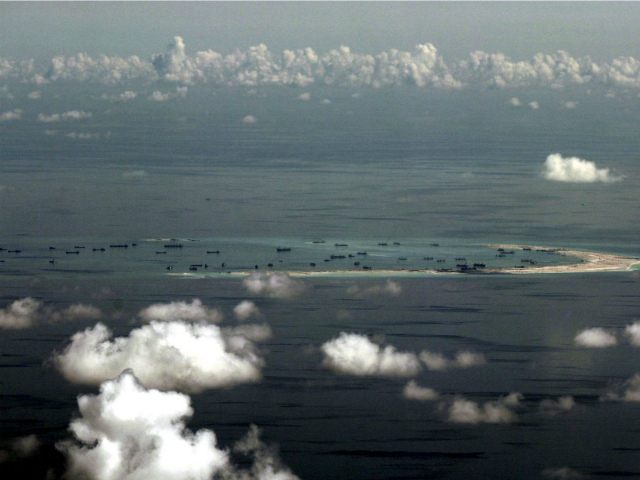Director of National Intelligence James Clapper warned in a letter to Sen. John McCain this week that he expects China to boast “substantial offensive military power” in the illegally-occupied territories of the South China Sea by the end of this year or the beginning of 2017.
The news comes as China announces a plan to soon begin offering civilian flights to Woody Island in the Spratly Island archipelago of the South China Sea, a contested territory also claimed by the Philippines and Vietnam.
“Based on the pace and scope of construction at these outposts, China will be able to deploy a range of offensive and defensive military capabilities and support increased PLAN and CCG presence beginning in 2016,” Clapper said in his letter.
Clapper’s letter is a response to an inquiry on behalf of the U.S. Senate Armed Services Committee, published this week by the U.S. Naval Institute. “Once these facilities are completed by the end of 2016 or early 2017, China will have significant capacity to quickly project substantial offensive military power to the region,” he added.
Clapper suggested China may ultimately reclaim up to 1,000 more acres of territory than those that belong to China uncontestedly.
China has begun militarizing artificial islands created on reefs in both the Spratly and Paracel Islands this year. On Woody Island in particular, China has stored multiple fighter jets and surface-to-air missiles. In the Paracel Islands, claimed by Vietnam, China has begun construction on an advanced radar system.
China begun asserting its sovereignty over most of the South China Sea two years ago, using territorial claims no other country in the world acknowledges. The area in question is claimed in part by Vietnam, the Philippines, Malaysia, Brunei, and Taiwan. China has used Taiwan’s claims to bolster its own, as it does not recognize Taiwan as a sovereign nation, but as a Chinese territory.
Chinese officials announced on Friday that they are planning to begin civilian flights to Woody Island within the next year. China has developed Sansha city on the island as a new flight destination, in addition to using the island for military facilities. “The infrastructure of Sansha City in southern China’s island province of Hainan has significantly improved, a city official has said, noting that civilian flights are expected to debut within a year,” Chinese state media outlet Xinhua announced, noting that “waste water treatment facilities, garbage collection and transfer stations, and marine environmental monitoring stations have also sprung up.”
While China has openly boasted of its construction in the region, many believe it violates international law, and the Philippines has filed a case at the Permanent Court of Arbitration at The Hague regarding where China’s sovereignty ends in the region. Beijing has vowed to disregard any verdict handed down by the Hague. The Philippines, meanwhile, has continued to search for avenues in which to strengthen its military in the hope of containing any more Chinese incursions on its territory. This week, Manila signed an agreement with Japan which would allow Tokyo to sell military technology to the Philippine government. While the two have not confirmed what specific items Japan will sell to the Philippines, surveillance aircraft currently top the list of speculation, which would allow the Philippines to keep track of Chinese activity in the Spratly Islands more closely.
In response, a column in China’s state-run Global Times has threatened the Philippines with military retribution should it attempt to use any purchased aircraft to monitor the area. “By no means will Manila’s air planes be allowed to fly into China’s territorial airspace. It will a pay due price once it crosses the bottom line,” the column reads. “Chinese military forces not only are able to effectively detect, trace and intercept any foreign aircraft intruding into our territory, but also have the right to take any necessary measures to safeguard national sovereignty and security.” The piece also accuses the Philippines of “constant provocations” against China and having the “obvious intention of beefing up its military presence by embroiling third parties to stir up troubles.”
The Global Times also ran a piece attacking Vietnam, a fellow communist nation, implying that the government in Hanoi is attempting to use ideological ties to disadvantage China in the South China Sea. “Special envoy diplomacy reflects opportunism in Vietnam,” argues the piece, describing the “party-to-party relationship” as a “special channel” that should not be used to advance “selfish calculations.”

COMMENTS
Please let us know if you're having issues with commenting.